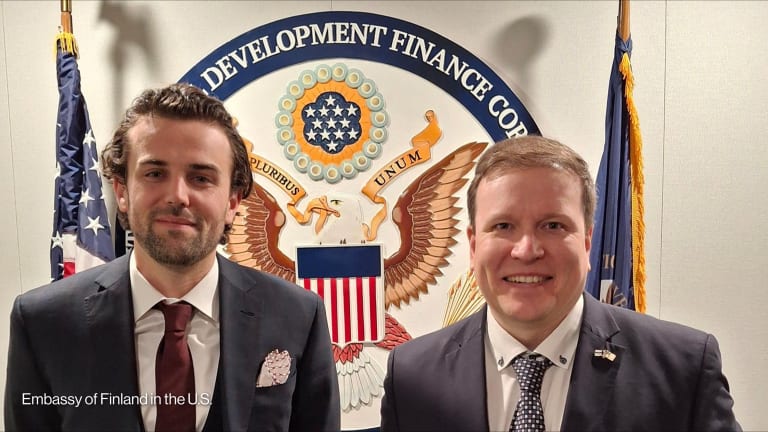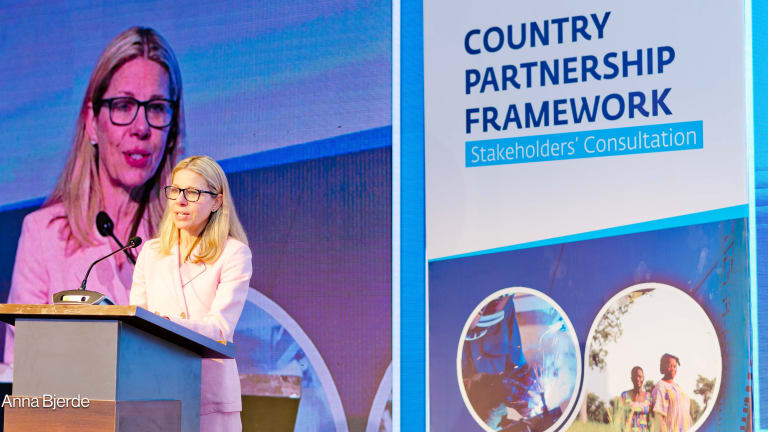Q&A: IDB takes a tech-focused approach in Honduras
As the Inter-American Development Bank celebrates its 60th anniversary, IDB Honduras country representative Eduardo Marques Almeida explains the bank's strategy on tech and migration.
WASHINGTON — As the Inter-American Development Bank celebrates its 60th anniversary, it is considering how the bank’s portfolio has evolved to meet current and upcoming challenges in Honduras, a country that has suffered from chronically high unemployment and low economic growth. Honduras has struggled to attract private sector investment amid ongoing gang violence that has seen it labeled one of the most violent countries in the world. “The most important thing here in Honduras is to try to coordinate and to integrate efforts, not only with the other donors but also with the private sector and civil society. That’s exactly what we’re trying to do here,” said Eduardo Marques Almeida, IDB’s Honduras country representative. “I think it’s the only way we can tackle political, economic, and social issues of the country.” “We don’t see constraints to collaborate. We know that USAID is going to be here for a while, so we know that we are long-term agencies and we have long-term action plans for the country.” --— Eduardo Marques Almeida, IDB Honduras country representative IDB works with the Honduran government, U.S. government donors such as the U.S. Agency for International Development, and the European Union to ensure its development investments are complementary to what other donors are doing. “We all know the issues, we all know the difficulties, we all know the challenges,” Marques said. “Now, we have to more and more try to work together to solve the same issues and challenges, and share financial resources and knowledge.” Marques recently spoke with Devex about the bank’s strategy to prevent migration, how its partnership with the U.S. is evolving, and why the bank sees technology as particularly integral for Honduran economic growth. This conversation has been edited for length and clarity. How has the bank’s activity in Honduras evolved to meet current needs? The bank, over the last 60 years, changed a little bit from pure infrastructure to more social projects. Recently we have been very much involved in projects such as social protection, education, health. More broadly, we’re now investing in projects which are related to the same things, like education and health, but with a different perspective: the perspective of technology. We’re in the process of approving a project on digital agenda, which will include things like broadband infrastructure in the country, e-governance, the digital economy, and so on. We are very much focused on everything that is related to technology in all different parts of the investments we are making. In terms of numbers, we have $900 million in portfolio now and we have $400 million in pipeline. So that means we will approve $400 million in 2019 and in 2020 for the two years. Taking into account that we disburse something like $200 million — more or less — a year, the portfolio’s probably going to go up to something like $1.1 billion. The current portfolio, it’s very much focused on roads, social protection, education, health, and institutionality development. We’re helping the country on management of their revenues as well as the fiscal management. We will try to reinforce much more the technology, the innovation part of each one of the sectors. Why is technology so important for bank investments? The country can make quantum leaps if we invest in technology. For example, if we invest in education, in e-learning, we can more and more increase the quality of education in a fast way instead of just going through the traditional process of developing teachers and developing infrastructure and so on. There are many studies that show that the soft investments in education are much more cost-effective than hard investments, although many governments invest much more in construction of schools, which is where normally the big money is. The more effective way of investing in education is more the soft part, and the soft part is all dependent on technology. We have one project in a city called El Paraíso where we have a hub, a school. Now, we are putting containers in the rural areas — these classes are digitally connected with the hub. Some classes would be given with the use of e-learning, so one teacher can give classes to five or six containers. This assures, in a way, quality of education that is being provided to the containers, as well as you can have less resources and accessing much more people. “There’s no other way of preventing migration than generating jobs where people live, as well as improving the way people are educated.” --— This is an example, but we have some tech, for example, in health which is the same. Using remote medicine, telemedicine, and all these kinds of things. We are implementing this idea in the health networks that we’re forming in different places in the country, in hospitals as well as in health centers, and so on. How does the bank approach the issue of migration? We have to try to prevent migration by using mechanisms to generate jobs and education to improve the opportunities. There’s no other way of preventing migration than generating jobs where people live, as well as improving the way people are educated. This is something that has medium- to long-term impacts, but it’s the best way to do it. More than 80,000 people have returned, especially from Mexico and the U.S., to Honduras. We understand that about 80% of these people migrate back again, but it’s important to understand what to do with these 80,000 people who are returning every year because when they return, they return different. Sometimes because they are frustrated because they were not able to migrate to the U.S. On the other hand, there are people who have been working in the U.S. or Mexico for a while. This creates a social issue for these people who migrate, not only in their communities but also in the country as a whole. As this process has happened for the last 20 or 30 years, it really changes the way people live in the country. What role does the private sector play in both preventing migration and reintegrating migrants? The private sector is absolutely fundamental. In Honduras, 80% of the investments are done by the private sector. The government cannot generate and create jobs — it’s the private sector that can create jobs. So the private sector is critical to generate more investments and to increase jobs in the country. We’re also helping the country, both the private sector and the government, to improve the environments to attract more foreign and international investment in companies so we can then generate jobs and prevent or avoid immigration. You work closely with partners in the region. How has the changing U.S. role in Honduras impacted your work and ability to partner with them? In all projects we develop, we always search for investments from other donors: USAID or maybe other bilateral agencies as well as multilateral agencies. We try to leverage what we do with co-financing as well as collaborating with other agencies. For example, we are also approving a project on rural development of $90 million. We are working very closely with USAID as well as the European Union and the World Bank in the “dry corridor.” All of these institutions have programs to reduce poverty with the small producers. What we’re doing is we are complementing the investments they have already done. So for example, if USAID has developed a community with a cooperative with market linkages or with financing, we can then complement with works on, for example, irrigation, which is something that USAID doesn’t do. The same thing with the World Bank and the European Union. At the end of the day, what we are worried about is to reduce poverty. We’ll complement — we’ll never compete with them. You’re currently partnering with USAID in Honduras on initiatives such as the Transforming Market Systems project, despite a shut-off of U.S. foreign assistance to the country. Is there any concern from the bank that this close collaboration might no longer be possible given U.S. government policies in the region? No, I don’t see that. We work with what the U.S. — USAID particularly — with what they have. So if they can only fund the transforming market systems program with their environment, we work with TMS and we complement with other resources. We don’t see constraints to collaborate. We know that USAID is going to be here for a while, so we know that we are long-term agencies and we have long-term action plans for the country. At the end of the day, it’s the governments and, in a way, the private sector which should coordinate what we do. I don’t see a problem right now. Maybe there are less resources than here were some time ago, but I think the resources are coming back again, and we work with the resources that exist.
WASHINGTON — As the Inter-American Development Bank celebrates its 60th anniversary, it is considering how the bank’s portfolio has evolved to meet current and upcoming challenges in Honduras, a country that has suffered from chronically high unemployment and low economic growth.
Honduras has struggled to attract private sector investment amid ongoing gang violence that has seen it labeled one of the most violent countries in the world.
“The most important thing here in Honduras is to try to coordinate and to integrate efforts, not only with the other donors but also with the private sector and civil society. That’s exactly what we’re trying to do here,” said Eduardo Marques Almeida, IDB’s Honduras country representative. “I think it’s the only way we can tackle political, economic, and social issues of the country.”
This story is forDevex Promembers
Unlock this story now with a 15-day free trial of Devex Pro.
With a Devex Pro subscription you'll get access to deeper analysis and exclusive insights from our reporters and analysts.
Start my free trialRequest a group subscription Printing articles to share with others is a breach of our terms and conditions and copyright policy. Please use the sharing options on the left side of the article. Devex Pro members may share up to 10 articles per month using the Pro share tool ( ).
Teresa Welsh is a Senior Reporter at Devex. She has reported from more than 10 countries and is currently based in Washington, D.C. Her coverage focuses on Latin America; U.S. foreign assistance policy; fragile states; food systems and nutrition; and refugees and migration. Prior to joining Devex, Teresa worked at McClatchy's Washington Bureau and covered foreign affairs for U.S. News and World Report. She was a reporter in Colombia, where she previously lived teaching English. Teresa earned bachelor of arts degrees in journalism and Latin American studies from the University of Wisconsin.








